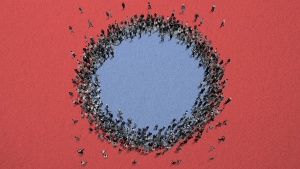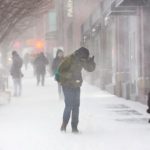This Map Shows Where People’s “Civic Space” Is Most Threatened
Since President Trump’s election, Republicans officials in nearly one-third of the country’s states have lobbied for ways to reduce political dissent. As the Washington Post has reported, that includes laws against protesting by ratcheting up punishments for highways, outlawing the use of masks to conceal your identity, and in more extreme cases even absolving drivers who might hit those obstructing traffic, and making demonstrators financially liable for any resulting violence or property damage.
But those limitations may restrain more than just one kind of action. They could create a chilling effect that hurts societal progress. According to Civicus, a worldwide alliance for citizen participation, those countries with the most open “civic space”—a catchall term for people’s ability to associate, assemble, and express themselves freely—tend to develop more powerful democracies, with citizens scoring higher on international indexes for human development, having more electoral freedom, and lower income inequality.
By that argument, limiting free expression is akin to limiting societal advancement, in which case the world may be in trouble. A recent Civicus analysis has found that among all United Nations countries (plus Kosovo and Palestine) just 3% of the world’s population lives in areas where civic space is truly open, free of pressures or threats to stop assemble. Over 40% are in places where that right is repressed or taken away altogether.
The results look rosier–but not much–in a per-country breakdown. On a sliding scale of “Open,” “Narrowed,” “Obstructed,” “Repressed,” or “Closed,” (read the full definitions here) only 26 of 195 countries have created open civic space. In the U.S., which in recent months has seen Black Lives Matter and Dakota Pipeline protesters pressured and arrested, falls into “narrowed” territory, meaning those who form associations to share their own opinions may be subject to “harassment, arrest, or assault”, protests can be denied or broken up by excessive force, and journalists face obstacles in reporting the truth.
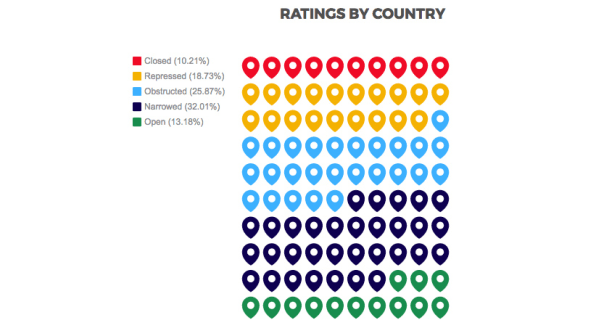
To keep activists apprised of such shifts, Civicus has created the Civicus Monitor, an interactive map that ranks relative levels of openness in every country around the world. Since its launch in April, the service has provided daily updates on violations impacting those scores. The site includes a watch list that, early on, noted state repression in Cameroon where Anglophone activists were being arrested, and tortured during an internet blackout, alongside warnings that, in the U.S., Trump’s “vilification of mainstream media houses” is hurting press freedom while “a growing number of states pass or prepare new laws to curtail protest rights.” ‘The group’s current watch list of oppressed spots includes Angola, Kenya, Tanzania, Turkey, and Venezuela.
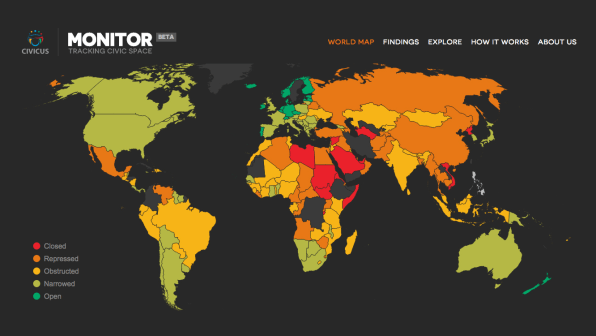
Civicus Monitor data is generated through a collaboration with more than 20 civil society research partners (alphabetically, it ranges from the Asia Democracy Network to West African Human Rights Defenders Network), and other independent societal scoring agencies (which include Freedom House, Reporters Without Borders, and the University of North Carolina which runs the Political Terror Scale.) Civicus adds in-house research that’s been reviewed peer groups like the United National Human Rights Council, and contacts activist groups, who can also report infractions directly through the service to ensure what’s being shared accurately reflects what’s happening in the group.
Civicus’s research shows that 20 countries–mostly in Africa and Asia–have totally closed civic space. “In one almost unbroken swathe of territory, across a dozen countries stretching from Kinshasa to Tehran, it is next to impossible for activists to conduct human rights advocacy or peacefully oppose the state without the very real risk of attack, imprisonment or death,” notes a recent report.
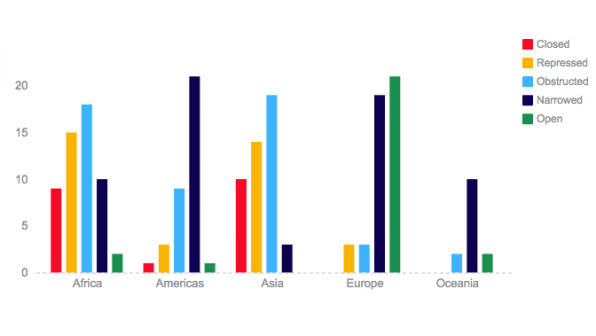
How exactly does civic space get shuttered? The most obvious and widely used tactic appears to be detaining activists, most often those expressing political dissent or decrying or monitoring human rights violations. In less than a year of collecting such data–from June 2016 and March 2017–the group cataloged 160 overall reports. Security or police using excessive force to break up protests including tear gas and rubber bullets comes next (112 reports); such tactics are most likely to occur again to silence those speaking out against government decision, but social and economic-based demonstrations, and human rights gatherings often get hit.
Civicus counted 101 attacks against journalists trying to cover related news in the field last year, ranging from online threats and intimidation for covering war crimes and corruption in the Balkans, which are generally “narrowed” to widespread killings of journalists covering the complicated war against organized crime in Mexico, which ranks as “repressed.”
“We believe we are seeing a global emergency on civic space,” Civicus’s General Secretary Danny Sriskandarajah writes in an email to Fast Company. “Many governments seem to be fearing an independent and vocal civil society, and have been locking up activists who speak out, shutting down peaceful protests, restricting income streams of civil society organizations and demonizing them in the political realm . . . Now, more than ever, we need an active not suppressed citizenry.”
From threatening journalists to arresting prostestors, the Civicus Monitor shows how countries are keeping their citizens from full freedom of expression.
Since President Trump’s election, Republicans officials in nearly one-third of the country’s states have lobbied for ways to reduce political dissent. As the Washington Post has reported, that includes laws against protesting by ratcheting up punishments for highways, outlawing the use of masks to conceal your identity, and in more extreme cases even absolving drivers who might hit those obstructing traffic, and making demonstrators financially liable for any resulting violence or property damage.
Fast Company , Read Full Story
(7)

